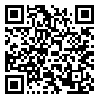Volume 11, Issue 2 (Winter 2026)
Health in Emergencies and Disasters Quarterly 2026, 11(2): 103-114 |
Back to browse issues page
Ethics code: (IR.MUI.NUREMA.REC.1400.184)
Download citation:
BibTeX | RIS | EndNote | Medlars | ProCite | Reference Manager | RefWorks
Send citation to:



BibTeX | RIS | EndNote | Medlars | ProCite | Reference Manager | RefWorks
Send citation to:
Panahi S, Heidari Z, Atighechian G, Heidarpour M, Ashrafi-Rizi H. Mapping Disaster Health Literacy for Chronic Patients: A Scoping Scientometric Analysis. Health in Emergencies and Disasters Quarterly 2026; 11 (2) :103-114
URL: http://hdq.uswr.ac.ir/article-1-685-en.html
URL: http://hdq.uswr.ac.ir/article-1-685-en.html
Somayeh Panahi1 

 , Zahra Heidari2
, Zahra Heidari2 

 , Golrokh Atighechian3
, Golrokh Atighechian3 

 , Maryam Heidarpour4
, Maryam Heidarpour4 

 , Hasan Ashrafi-Rizi *5
, Hasan Ashrafi-Rizi *5 




 , Zahra Heidari2
, Zahra Heidari2 

 , Golrokh Atighechian3
, Golrokh Atighechian3 

 , Maryam Heidarpour4
, Maryam Heidarpour4 

 , Hasan Ashrafi-Rizi *5
, Hasan Ashrafi-Rizi *5 


1- Department of Health Information Technology, School of Allied Medical Sciences, Golestan University of Medical Sciences, Gorgan, Iran.
2- Department of Biostatistics and Epidemiology, Applied Physiology Research Center, School of Health, Cardiovascular Research Institute, Isfahan University of Medical Sciences, Isfahan, Iran.
3- Health Management and Economics Research Center, Isfahan University of Medical Sciences, Isfahan, Iran.
4- Isfahan Endocrine and Metabolism Research Center, Isfahan University of Medical Sciences, Isfahan, Iran.
5- Department of Medical Library and Information Science, Health Information Technology Research Center, Isfahan University of Medical Sciences, Isfahan, Iran. ,hassanashrafi@mng.mui.ac.ir
2- Department of Biostatistics and Epidemiology, Applied Physiology Research Center, School of Health, Cardiovascular Research Institute, Isfahan University of Medical Sciences, Isfahan, Iran.
3- Health Management and Economics Research Center, Isfahan University of Medical Sciences, Isfahan, Iran.
4- Isfahan Endocrine and Metabolism Research Center, Isfahan University of Medical Sciences, Isfahan, Iran.
5- Department of Medical Library and Information Science, Health Information Technology Research Center, Isfahan University of Medical Sciences, Isfahan, Iran. ,
Abstract: (1494 Views)
Background: Natural hazards pose threats and opportunities for enhancing health literacy among chronic patients. This study aimed to investigate temporal distribution patterns of health literacy literature in disasters, depict collaborations among researchers and leading countries, and provide insights for future research directions in this domain.
Materials and Methods: Mapping studies using bibliographic tools and an oriented scoping review were conducted. A search strategy utilizing synonymous terms for “disaster literacy and chronic diseases” was implemented on Scopus, Web of Science (WoS), and PubMed from inception to 2024, resulting in the retrieval of 1,885 articles. VOSviewer, UCINET, and NetDraw software performed analyses.
Results: The concept of disaster health literacy (DHL) has grown since 2019. Patients with diabetes, hypertension, respiratory diseases, asthma, cancer, those on dialysis, and stroke survivors faced the most challenges during disasters. Seven thematic clusters of studies were identified, encompassing research methods, types of literacy, vulnerable groups, chronic patients, study locations, disease management, and comorbidity types.
Conclusion: Improving DHL plays a pivotal role in empowering individuals with chronic conditions to navigate crises with greater resilience and informed decision-making. To mitigate adverse outcomes, it is essential that national emergency frameworks integrate targeted health literacy interventions tailored to the needs of vulnerable populations.
Materials and Methods: Mapping studies using bibliographic tools and an oriented scoping review were conducted. A search strategy utilizing synonymous terms for “disaster literacy and chronic diseases” was implemented on Scopus, Web of Science (WoS), and PubMed from inception to 2024, resulting in the retrieval of 1,885 articles. VOSviewer, UCINET, and NetDraw software performed analyses.
Results: The concept of disaster health literacy (DHL) has grown since 2019. Patients with diabetes, hypertension, respiratory diseases, asthma, cancer, those on dialysis, and stroke survivors faced the most challenges during disasters. Seven thematic clusters of studies were identified, encompassing research methods, types of literacy, vulnerable groups, chronic patients, study locations, disease management, and comorbidity types.
Conclusion: Improving DHL plays a pivotal role in empowering individuals with chronic conditions to navigate crises with greater resilience and informed decision-making. To mitigate adverse outcomes, it is essential that national emergency frameworks integrate targeted health literacy interventions tailored to the needs of vulnerable populations.
Keywords: Health literacy, Risk management, Chronic patients, Disaster planning, Bibliometric analysis, Natural hazards
Type of article: Review |
Subject:
Qualitative
Received: 2024/11/25 | Accepted: 2025/04/26 | Published: 2026/01/1
Received: 2024/11/25 | Accepted: 2025/04/26 | Published: 2026/01/1
Send email to the article author
| Rights and permissions | |
 |
This work is licensed under a Creative Commons Attribution-NonCommercial 4.0 International License. |





